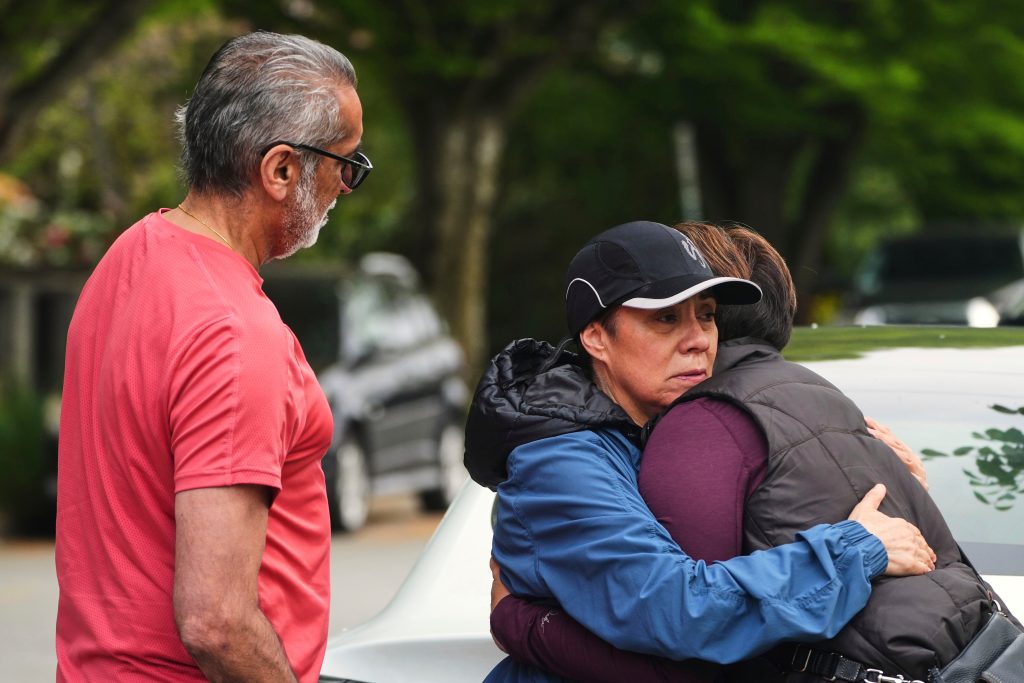Esperanza Bermudez, centre, who lives across the street from the scene, is comforted by friends Ronnie Claire, right, and Manjit Claire, the morning after a driver killed multiple people during a Filipino community festival on April 27 in Vancouver.Lindsey Wasson/The Associated Press
The 30-year-old suspect charged in the SUV-ramming attack at a Filipino festival in Vancouver that left at least 11 people dead has a “significant history of interactions with police and health care professionals related to mental health,” Vancouver Police Department Interim Chief Steve Rai said on Sunday.
That’s police-speak for what can be more plainly stated thus: “The man who allegedly went on a deadly rampage suffers from untreated mental illness, likely schizophrenia, and he’s been picked up numerous times in a psychotic state.”
The details will emerge in the fullness of time, during the inevitable criminal trial and public inquiry.
In the meantime, let’s not let this horrific event perpetuate the myth that all people with mental illness are violent (most are not), nor allow our anger to fuel the burgeoning reactionary enthusiasm for mandatory psychiatric imprisonment.
There’s a place for involuntary treatment – a small one. But the keyword there is “treatment.”
What one should retain, first and foremost, from the deadly attack at the Lapu-Lapu festival is that the alleged perpetrator could have and should have been treated long before this happened.
What happened after the numerous “interactions” with police and mental-health professionals? Was the suspect simply released again, and his condition allowed to deteriorate?
B.C. Premier David Eby said Sunday that “British Columbians are right to be angry,” and he’s right about that.
Reeling from attack, Vancouver’s Filipino community vows to stand strong
Senseless violence should enrage us. But we should also endeavour to understand why violent acts like this occur and point the fingers of blame in the right direction.
The relationship between violence and mental illness is complex.
The reality is that the vast majority of people with mental illness are not violent. In fact, they are about 11 times more likely to be victims of violence as perpetrators.
But there is a small subset of people in society who commit violent acts. According to a large U.S. study, about 2.8 per cent of people with severe mental illness commit violent acts, compared with 0.8 per cent of people without a diagnosed mental illness.
However, 10 per cent of people with both severe mental illness and substance-use disorder commit violent acts.
That’s an important reminder that there are well-known triggers for violence, chief among them misuse of substances, from alcohol through to meth.
The suspect in the Vancouver mass killing supposedly suffers from schizophrenia, a mental illness that can have particularly grave symptoms. Again, most people with schizophrenia are not violent.
But schizophrenia patients can have clinical symptoms that are associated with violent acts, including potentially hearing voices telling them to harm others, poor impulse control, lack of empathy or an overwhelming sense of their own power.
Any fan of police procedurals or murder mysteries will know these stereotypes well.
People with or without mental illness can also be influenced by their environment. People raised in a violent neighbourhood or household are more likely to be violent.
But more likely doesn’t mean predestined.
And therein lies the difficulty. It’s virtually impossible to predict who will be violent.
The best prediction tool is actually previous violent acts. That’s why we need to know more detail of the police interactions with the suspect.
One of the most common responses to the news that the suspect suffers from mental illness is people saying it’s just an excuse.
But we need to remember it’s not a “get out of jail free” card. People with mental illness are responsible for their actions.
Only in rare instances are they deemed not criminally responsible for an act they committed because a mental disorder prevented them from understanding the nature and quality of the act.
We’re still a long way from that discussion in this case.
Where our attention should be focused, other than helping survivors and family members of the victims deal with the trauma, is on getting the legions of sick people on our streets the care they need before they harm themselves or others.
The post We shouldn’t let this horrific attack perpetuate the myth that all people with mental illness are violent appeared first on World Online.

